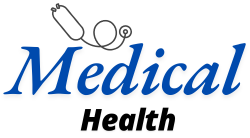You want to stay alive and kicking? It’s not that hard, but you gotta pay attention.
We’re talking about the basics here – food, water, moving around, sleep, keeping the stress down, getting checked out, and not being a hermit.
They all stick together like a bunch of drunk buddies, so keep them all in check.
Some egghead study from 2023, in some paper called “The Lancet,” says if you do four of these things right, you’ve got a good chance of not getting some nasty disease. So, let’s get down to it, no time for BS.
First, fuel, your food. Keep it real, whole foods. No processed garbage.
Think fruits, veggies, lean meat, and the good fats.
Your plate should be a rainbow, like a drunk painter went to town.
Berries, those little guys, pack a punch with antioxidants, they’re like tiny warriors fighting off bad guys in your cells.
Dark greens, full of vitamins, they keep you sharp, like a new knife.
Citrus, that vitamin C boost keeps you from catching a cold. Check the list, it ain’t that hard to figure out:
| Fruit/Vegetable | What’s Inside | What It Does for You |
|---|---|---|
| Berries | Vitamin C, antioxidants, fiber | Keeps you from getting sick, protects cells, helps you go to the bathroom |
| Leafy Greens | Vitamins A, C, K, folate, minerals | Strong bones, good eyesight, healthy blood |
| Carrots | Vitamin A, fiber | Helps you see in the dark, keeps your guts happy |
| Citrus Fruits | Vitamin C | Boosts your defenses, helps you absorb iron, like a good sidekick |
| Tomatoes | Lycopene, vitamin C | Protects the heart and stuff, good immunity |
| Avocados | Healthy fats, potassium, fiber | Keeps your heart happy, helps the pipes work smooth, what else do you need? |
Protein, the stuff that keeps you strong. Chicken breast, fish, beans, lentils.
They ain’t just for muscles, they help rebuild and keep you going. A little at each meal, that’s the trick. Plant stuff, meat stuff, all good. And fats, don’t be scared of the good ones. Avocados, nuts, seeds, olive oil. They fuel the brain and keeps things moving. Avoid the sugary, processed crap. It’s the enemy, like a bad hangover.
Next, water. You’re basically a walking water bag, keep it full.
It’s not just when you’re thirsty, keep sipping all day.
Electrolytes, those little helpers, make sure you don’t dry out. Find them in bananas, spinach, avocados. They balance the fluids.
Don’t ignore your body, when you’re thirsty, you’re thirsty.
Move your ass, don’t be a potato. Find something you like, stick with it.
Cardio, gets the heart pumping, strength training, keeps the muscles strong. Like a good whiskey, they both help you. Walk, take the stairs. Find ways to move.
Sleep, that’s when you reset. Seven to nine hours each night. No less, no more. Keep a schedule. Make a routine that helps you relax before bed.
It’s like setting the mood for a good night, you know?
Stress, it’s everywhere, but don’t let it win. Mindfulness, meditation, to keep the mind sharp. Exercise, to release the tension. Social connections, to keep you from going crazy. They all help you deal with the mess.
Check-ups, they aren’t just when you are about to kick the bucket. They’re for keeping you from kicking it.
Regular visits to the doc, make sure everything is ok. Don’t ignore the signals.
Preventive screenings are key, catching stuff early can save your life, no drama here.
Last, the connections, the people in your life. Don’t be a loner.
Nurture those relationships, they’re like the fuel to your engine.
These aren’t rules, they are just guides, not about perfection, just about being consistent.
Take care of your body like it’s a vintage car, because it’s all you got, that’s your life there, pal.
Nourish Your Body With Whole Foods

Fueling your body right isn’t complicated, it’s about keeping things real.
You wouldn’t put bad gas in a good car, and your body is no different.
Whole foods, the stuff that comes from the earth or the sea, are the ticket.
Forget the processed nonsense, we’re talking about the good stuff—fruits, vegetables, lean meats, and the fats that do a body good.
It’s about making choices that keep you going strong.
Eating well isn’t about some fancy diet, it’s about respecting what you’re made of.
When you eat right, you feel it—more energy, better sleep, and a mind that’s sharp.
We need the vitamins, the minerals, all the bits and pieces that keep us moving. Don’t let a box or a can tell you what’s good. Look to the source.
This is the foundation of everything else, your starting point.
Prioritize Fruits and Vegetables
Fruits and vegetables, they’re not just sides, they’re the main event.
Think of colors—red peppers, green spinach, blue berries, each brings something different to the table.
These aren’t just empty calories, they’re packed with the good stuff your body needs—vitamins, minerals, and fiber.
Aim for a plate that looks like a rainbow, it’s not just pretty, it’s smart.
- Vitamins and Minerals: These are the essential building blocks for a healthy body. They keep your cells working right, your immune system strong, and your energy up.
- Fiber: Fiber is crucial for digestion. It keeps everything moving and helps keep you feeling full.
- Antioxidants: These help fight off the bad stuff, the free radicals that can cause damage to your cells.
| Fruit/Vegetable | Key Nutrients | Health Benefits |
| Berries | Vitamin C, antioxidants, fiber | Boosts immunity, protects cells, aids digestion |
| Leafy Greens | Vitamins A, C, K, folate, minerals | Promotes bone health, supports vision, boosts blood health |
| Carrots | Vitamin A, fiber | Improves vision, aids digestion |
| Citrus Fruits | Vitamin C | Boosts immunity, helps with iron absorption |
| Tomatoes | Lycopene, vitamin C | Protects against heart disease and some cancers, boosts immunity |
| Avocados | Healthy fats, potassium, fiber | Supports heart health, aids digestion |
- Variety is Key: Don’t get stuck on just a few choices. The more you mix it up, the more you benefit.
- Fresh is Best: When you can, go for fresh produce. If not, frozen is a good second choice.
- Think Seasonally: Seasonal produce tastes better and is often more affordable.
Choose Lean Proteins
Protein, it’s the building block.
We’re not talking about mountains of meat, we’re talking about lean sources that do the job right.
Think chicken breast, fish, beans, lentils, and the occasional lean cut of beef. It’s what keeps you strong and helps you rebuild.
Each meal should have a good source of protein, not just for muscle, but for everything.
- Muscle Building: Protein is essential for building and repairing muscles, vital for strength and movement.
- Satiety: Protein keeps you feeling full longer, which can help manage weight.
- Essential Nutrients: Many protein sources also provide important vitamins and minerals, like iron and B vitamins.
| Protein Source | Key Nutrients | Health Benefits |
|---|---|---|
| Chicken Breast | Protein, B vitamins, niacin | Supports muscle growth, provides energy |
| Fish Salmon | Protein, omega-3 fatty acids | Promotes heart health, reduces inflammation |
| Lentils | Protein, fiber, iron | Aids digestion, supports blood health, great for vegetarian options |
| Beans | Protein, fiber, iron | Promotes digestive health, plant-based protein alternative |
| Lean Beef | Protein, iron, B vitamins | Supports muscle growth and oxygen transport in moderation |
- Don’t Overdo It: You don’t need huge portions. A moderate amount at each meal is plenty.
- Variety Matters: Mix up your protein sources to get a wide range of nutrients.
- Plant-Based Options: Don’t underestimate plant proteins; they are a great way to get your protein and fiber.
Embrace Healthy Fats
Fats, they get a bad rap, but the truth is, you need them. Not all fats are created equal.
We’re talking about the good ones—the fats from avocados, nuts, seeds, and olive oil.
These are the fats that keep your brain sharp and your body running smoothly.
It’s not about cutting out all fat, it’s about choosing the right ones.
- Brain Function: Fats, especially omega-3s, are crucial for brain health and function.
- Nutrient Absorption: Certain vitamins are fat-soluble, meaning your body needs fat to absorb them properly.
- Energy Source: Fats provide a sustained energy source, keeping you feeling fuller and more energized throughout the day.
| Fat Source | Key Nutrients | Health Benefits |
|---|---|---|
| Avocados | Monounsaturated fats, potassium, fiber | Promotes heart health, aids digestion, provides essential nutrients |
| Nuts Almonds, Walnuts | Healthy fats, protein, vitamins, minerals | Supports brain health, provides energy, helps lower bad cholesterol |
| Seeds Chia, Flax | Omega-3 fatty acids, fiber, minerals | Reduces inflammation, aids digestion, promotes heart health |
| Olive Oil | Monounsaturated fats, antioxidants | Supports heart health, reduces inflammation |
| Fatty Fish Salmon | Omega-3 fatty acids | Improves heart and brain function, reduces inflammation, supports eye health |
- Go for Unsaturated: Choose unsaturated fats over saturated and trans fats.
- Portion Control: Even healthy fats should be eaten in moderation.
- Read Labels: Be aware of hidden unhealthy fats in processed foods.
Limit Processed Foods and Sugars
Processed foods and sugars, they’re the enemy. They’re everywhere, but they don’t do you any good.
Empty calories, hidden sugars, and a long list of ingredients you can’t pronounce—that’s not what your body needs. Stick to real foods. It’s that simple. The less you mess with it, the better.
- Empty Calories: Processed foods often lack essential nutrients while being high in calories.
- Hidden Sugars: Added sugars can lead to weight gain, diabetes, and other health problems.
- Artificial Additives: Many processed foods contain additives that can be harmful to your health.
| Type of Food | Negative Health Effects |
|---|---|
| Sugary Drinks | Weight gain, increased risk of type 2 diabetes, heart disease |
| Processed Meats | Increased risk of cancer, heart disease |
| Fast Food | High in unhealthy fats, sodium, and calories; contributes to weight gain, heart disease |
| Packaged Snacks | Often high in salt, unhealthy fats, and added sugars, lacking in nutrients |
| Refined Grains | Spikes in blood sugar levels, less fiber, and fewer nutrients than whole grains |
- Read Labels: Become a label reader. Know what you’re putting into your body.
- Cook at Home: Cooking your own meals gives you control over what you eat.
- Gradual Reduction: You don’t need to quit everything at once. Start with small changes.
Hydrate Consistently Throughout the Day
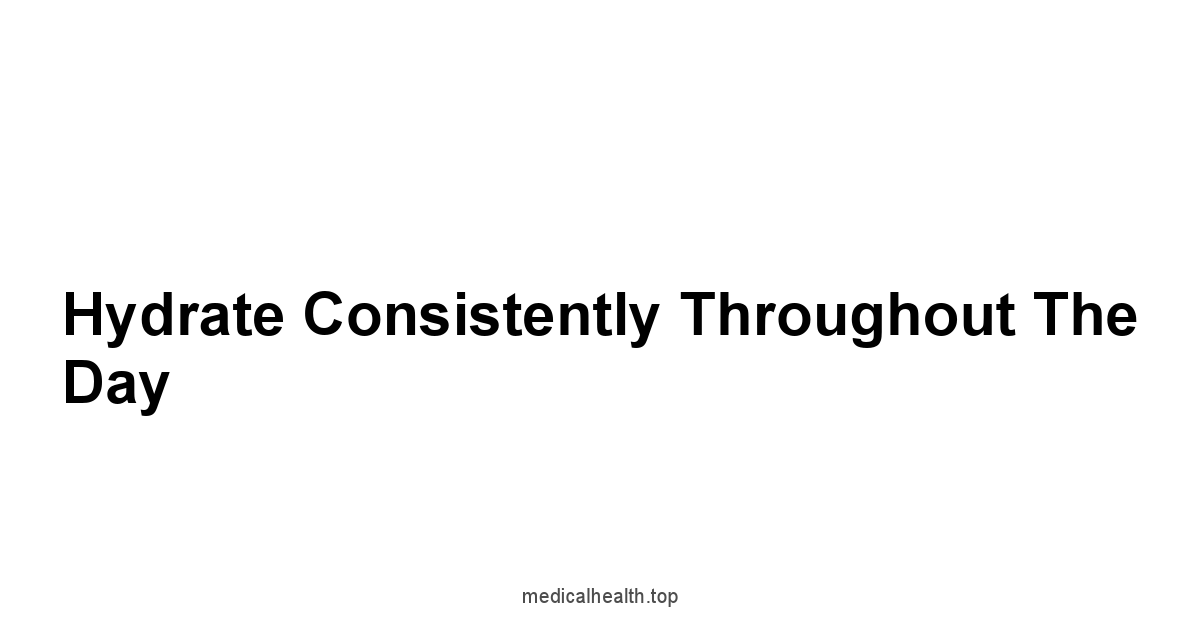
Water, it’s the essence of life.
You’re mostly water, and you need to keep that tank full.
It’s not about waiting until you’re thirsty, it’s about drinking regularly.
Think of water as a constant flow, keeping everything moving and working right. Don’t ignore this, it’s essential.
Proper hydration isn’t a luxury, it’s a necessity for every bodily function.
From regulating temperature to aiding digestion, water plays a crucial role in keeping everything in check.
It’s about more than just quenching thirst, it’s about sustaining your overall vitality.
This isn’t something to just think about when you’re feeling parched.
Drink Water Regularly
Water, it’s the most straightforward thing you can do for your health.
Keep a bottle handy, and sip on it throughout the day.
Don’t wait until you’re parched, by then, it’s too late. Make it a habit, a constant companion.
Think of it as fuel, keeping the engine running smoothly.
Aim for steady hydration, not just when you feel the urge.
- Improved Digestion: Water helps break down food and keeps things moving smoothly.
- Enhanced Energy: Dehydration can make you feel tired and sluggish, staying hydrated helps maintain energy levels.
- Better Skin: Proper hydration can keep your skin looking healthy and vibrant.
| Time of Day | Hydration Tips |
|---|---|
| Upon Waking | Drink a glass of water to rehydrate after sleep. |
| Before Meals | Have a glass of water before eating to aid digestion. |
| During Exercise | Sip water throughout your workout to replace lost fluids. |
| Between Meals | Drink water steadily between meals to keep yourself hydrated. |
| Before Bed | Have a small glass of water before bed to avoid overnight dehydration. |
- Carry a Water Bottle: Having a water bottle with you will remind you to drink water throughout the day.
- Set Reminders: Use alarms on your phone to remind you to take a drink of water.
- Infuse Your Water: If you find plain water boring, try adding some fruit or herbs for flavor.
Understand the Role of Electrolytes
Electrolytes, they’re not just for athletes, you need them too.
They’re minerals that help keep your body’s electrical system running.
When you sweat, you lose electrolytes, and you need to replace them. It’s not just about water, it’s about the balance. These little helpers keep everything in check.
Think of them as the essential workers in your body.
- Fluid Balance: Electrolytes help regulate the amount of fluid in your body.
- Muscle Function: They’re crucial for muscle contractions and proper nerve function.
- Nerve Function: Electrolytes are vital for sending nerve signals throughout the body.
| Electrolyte | Food Sources | Importance |
|---|---|---|
| Sodium | Table salt, processed foods, cured meats | Regulates blood pressure and fluid balance, crucial for nerve and muscle function |
| Potassium | Bananas, avocados, spinach, sweet potatoes | Supports heart function, regulates fluid balance |
| Calcium | Dairy products, leafy greens, fortified foods | Essential for strong bones and teeth, plays a role in muscle function |
| Magnesium | Nuts, seeds, leafy greens, whole grains | Supports muscle and nerve function, regulates blood sugar |
- Eat a Balanced Diet: A balanced diet that includes a variety of whole foods should provide sufficient electrolytes.
- Sports Drinks: These can be helpful after intense workouts, but they often contain added sugars, so use them wisely.
- Natural Sources: Look to whole foods like fruits and vegetables for your electrolyte needs.
Monitor Your Thirst Cues
Thirst, it’s a signal, a reminder from your body. Don’t ignore it. It’s not a suggestion, it’s a call for water.
Learn to listen to what your body is telling you, it’s one of the simplest ways to stay hydrated. Don’t wait until you feel parched.
Get ahead of the game and drink steadily throughout the day. Your body will thank you.
- Listen to Your Body: Your body sends signals when it needs water. Don’t ignore them.
- Don’t Wait Until You’re Thirsty: By the time you feel thirsty, you’re already slightly dehydrated.
- Pay Attention to Physical Cues: Other signs of dehydration include fatigue, headache, and dry mouth.
| Symptom | What It Might Indicate |
|---|---|
| Thirst | Your body needs water |
| Fatigue | Could be a sign of dehydration |
| Headache | Could be a sign of dehydration, or an electrolyte imbalance |
| Dry Mouth | A sign you are severely dehydrated |
| Dark Urine | Sign of mild dehydration, urine should be light yellow to clear |
| Muscle Cramps | May indicate electrolyte imbalance or dehydration |
- Check Your Urine: The color of your urine can be a good indicator of your hydration level. Pale yellow to clear is good, dark yellow means you need more water.
- Hydrate Regularly: Don’t wait for these symptoms to appear; drink regularly throughout the day.
- Be Mindful: Pay attention to how you feel. If you’re starting to feel tired or sluggish, drink some water.
Prioritize Regular Physical Activity
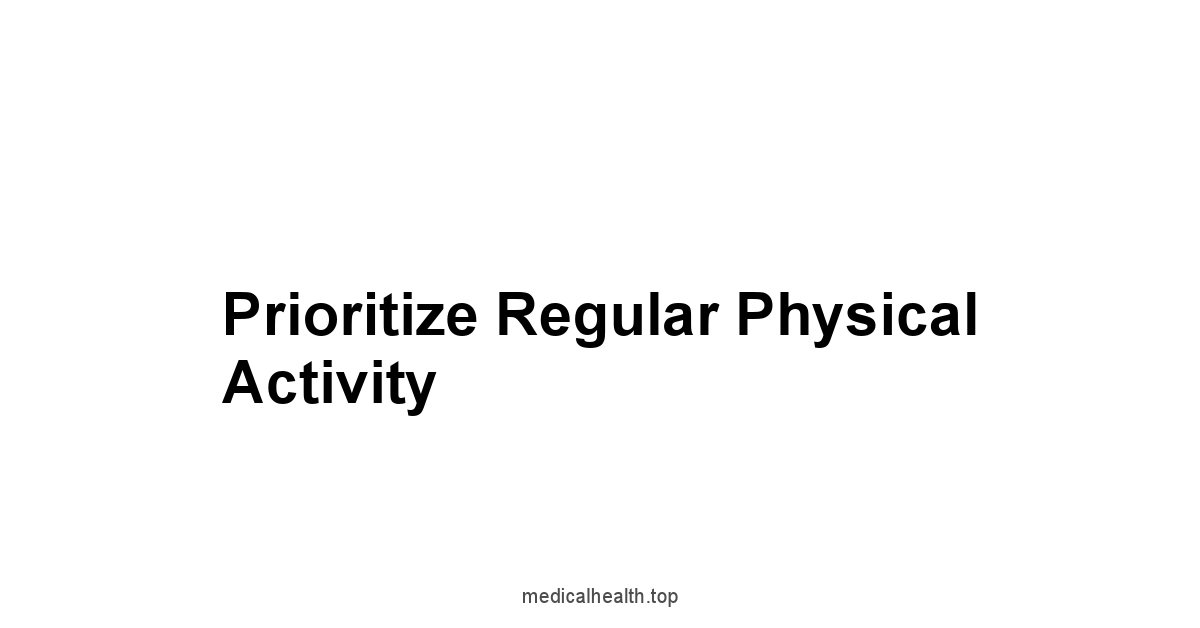
Movement, it’s life.
Your body is made to move, it’s not meant to be stuck in one spot all day.
Find something you like, something that gets you going.
It doesn’t have to be a chore, it should be something you look forward to.
Think of it as a way to keep the machine running smooth, a way to stay sharp.
Regular physical activity is not just about maintaining a healthy weight, it’s about fortifying your entire system.
Movement enhances mood, boosts energy, and strengthens your body’s resilience.
It’s an investment in your long-term wellbeing, a commitment to a life of vitality and vigor.
It’s about keeping your body, mind, and spirit in harmony.
Find a Workout You Enjoy
Exercise, it shouldn’t be a punishment. If you hate running, don’t run. Find something you like doing.
Maybe it’s dancing, swimming, hiking, or lifting weights, the key is to find something that you’ll stick with.
It’s not about what’s the best, it’s about what works for you.
Movement is movement, as long as you are moving it’s good.
- Experiment: Try different types of exercise to find what you enjoy.
- Start Small: Don’t feel pressured to start with an intense routine.
- Make It Social: Exercising with a friend can make it more enjoyable.
| Type of Activity | Benefits | Examples |
|---|---|---|
| Cardio | Improves heart health, boosts energy, helps with weight management | Running, swimming, cycling, dancing, brisk walking |
| Strength Training | Builds muscle, strengthens bones, boosts metabolism | Lifting weights, bodyweight exercises, using resistance bands |
| Flexibility | Increases range of motion, prevents injuries | Yoga, stretching, Pilates |
| Team Sports | Improves coordination, provides social interaction | Basketball, soccer, volleyball |
| Outdoor Activities | Connects you with nature, boosts mood, offers variety | Hiking, gardening, biking, kayaking, rock climbing |
- Set Realistic Goals: Don’t try to do too much too soon. It’s about consistency, not intensity.
- Track Your Progress: Monitoring your progress can keep you motivated.
- Listen to Your Body: Don’t push yourself too hard, especially when starting out.
Aim for a Balance of Cardio and Strength Training
Cardio and strength, you need both.
Cardio keeps your heart pumping, keeps the blood flowing.
Strength training keeps your muscles strong, your bones healthy. It’s not about picking one, it’s about doing both. Think of them as two halves of a whole. Each benefits the other, each is essential. This is about balance.
- Cardio Benefits: Improves heart health, increases endurance, helps burn calories.
- Strength Training Benefits: Builds muscle, strengthens bones, boosts metabolism, improves posture.
- Combined Benefits: Both types of exercise contribute to overall health, weight management, and well-being.
| Aspect | Cardio Training | Strength Training |
|---|---|---|
| Heart Health | Strengthens heart muscle, improves circulation | May indirectly improve heart health by boosting metabolism |
| Muscles | Builds endurance in muscles, increases blood flow | Builds muscle mass, strength, and endurance |
| Bones | Minimal direct impact | Increases bone density, helps prevent osteoporosis |
| Metabolism | Boosts metabolism during exercise | Boosts metabolism over time by increasing muscle mass |
| Weight Management | Burns calories during exercise, helps with calorie control | Increases calorie expenditure at rest, helps with calorie control |
| Energy Levels | Increases energy and endurance | Increases strength and energy levels |
- Mix It Up: Vary your workouts to avoid boredom and work different muscle groups.
- Focus on Form: Proper form is key to preventing injuries.
- Progress Gradually: Increase the intensity or duration of your workouts over time.
Incorporate Movement Into Daily Routines
You don’t have to go to the gym to move. Think of ways to add movement into your day.
Take the stairs instead of the elevator, walk instead of drive when you can, stand up and move around when you’re working.
It’s about being active, it’s about turning your daily routine into an opportunity to move. Little things add up.
- Increase Daily Activity: Even small increases in activity can make a difference.
- Break Up Sedentary Time: Take breaks throughout the day to move around.
- Incorporate Movement: Add movement into tasks you’re already doing.
| Activity | How to Incorporate it | Benefits |
|---|---|---|
| Walking | Take the stairs instead of the elevator, walk during breaks | Increases cardiovascular health, burns calories |
| Standing | Stand while working, instead of sitting | Improves posture, burns more calories than sitting |
| Stretching | Stretch throughout the day to keep muscles loose | Increases flexibility, reduces muscle tension |
| Household Chores | Incorporate movement into your chores, move while doing them | Increases daily movement, gets things done |
| Active Commuting | Walk or bike to work, if possible | Provides daily exercise, reduces dependence on cars |
- Make It a Habit: Find ways to make movement a natural part of your day.
- Use Technology: Use fitness trackers to monitor your activity level.
- Make It Fun: Find ways to make movement enjoyable so you are more likely to stick with it.
Ensure Adequate Sleep and Rest
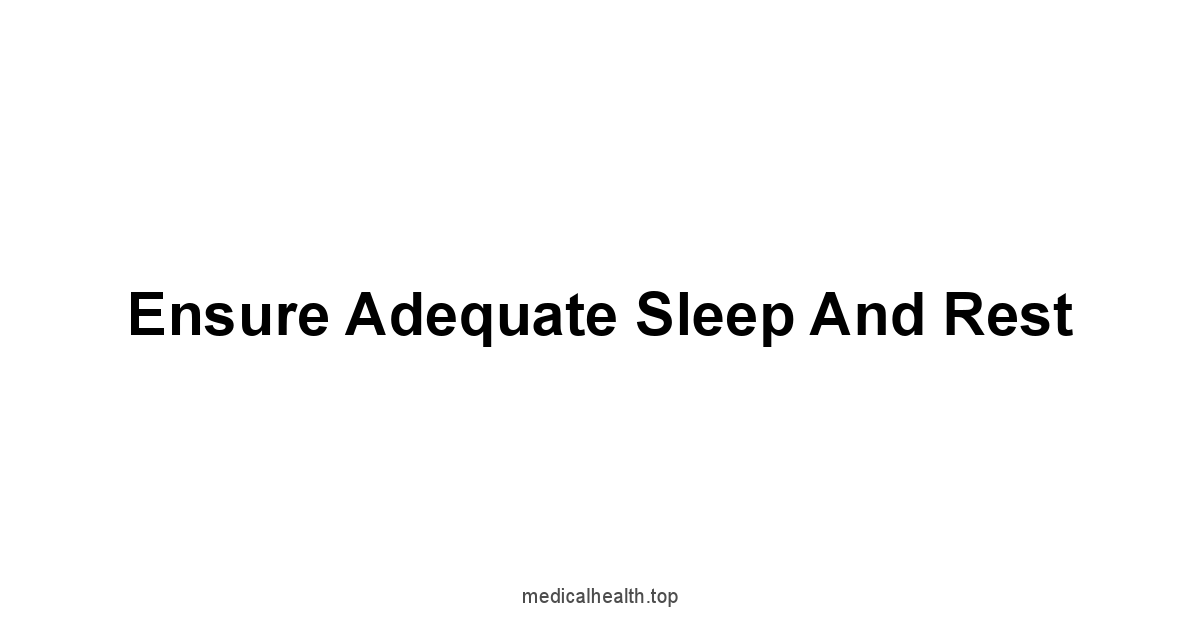
Sleep, it’s not a luxury, it’s a necessity.
It’s when your body repairs itself, when your mind resets.
Skimping on sleep is like running your car without oil, it just won’t work. You need the hours, the quiet, the dark.
Don’t undervalue the power of a good night’s rest, it sets the tone for everything else. It’s the foundation for a life well-lived.
Sleep isn’t merely a period of inactivity, it’s a critical phase where your body and mind rejuvenate.
Quality sleep is vital for cognitive function, emotional balance, and overall physical health.
It’s a cornerstone of your well-being, not something that can be compromised without consequence.
Make it a priority, and everything else will be easier.
Aim for Seven to Nine Hours of Sleep
Seven to nine hours, that’s the sweet spot for most adults. Don’t cut corners. Your body needs that time to recover, to rebuild.
It’s not just about how long you sleep, it’s about the quality of that sleep.
Don’t shortchange yourself, make sure you get the time you need. Think of sleep as your reset button.
- Recovery: Sleep is when your body repairs itself.
- Cognitive Function: Sleep is crucial for memory and concentration.
- Emotional Regulation: Lack of sleep can affect your mood.
| Sleep Duration | Benefits |
|---|---|
| 7-9 Hours | Optimal for physical and mental health, promotes cognitive function, mood balance |
| Less than 7 Hours | Increased risk of health problems, decreased cognitive function, mood changes |
| More than 9 Hours | May indicate underlying health problems, not necessarily beneficial |
- Consistency is Key: Try to go to bed and wake up at the same time each day, even on weekends.
- Track Your Sleep: Use a sleep tracker or journal to monitor your sleep patterns.
- Prioritize Sleep: Make sleep a priority and plan your day accordingly to ensure you get enough.
Establish a Consistent Sleep Schedule
A consistent schedule, it’s like a rhythm.
Your body thrives on routine, and your sleep is no exception.
Go to bed and wake up at the same time each day, even on the weekends. It helps regulate your body’s natural clock. This regularity is essential for quality rest.
It’s about training your body to rest when it should.
- Regulates Circadian Rhythm: A consistent schedule helps set your body’s natural sleep-wake cycle.
- Improves Sleep Quality: Going to bed and waking up at the same time each day improves your sleep quality.
- Makes It Easier to Fall Asleep: A consistent schedule can help you fall asleep faster and easier.
| Strategy | How It Helps |
|---|---|
| Set Bedtime | Choose a bedtime that allows for 7-9 hours of sleep, and try to stick to it |
| Set Wake Time | Choose a wake time that is consistent, and stick to it even on weekends |
| Regularity | Maintain a consistent sleep and wake schedule, even on your days off. |
| Be Patient | It can take time to adjust to a new sleep schedule, be consistent and patient |
- Stick to It: Don’t deviate from your schedule, especially on the weekends.
- Gradual Changes: If your sleep schedule is inconsistent, make gradual changes rather than drastic ones.
- Be Consistent: The key is consistency. The more regular you are, the better you will sleep.

Create a Relaxing Bedtime Routine
A bedtime routine, it sets the stage.
It’s about winding down, about signaling to your body that it’s time to rest.
Think of it as a transition, from the activity of the day to the quiet of the night.
Find things that help you relax, read a book, take a warm bath, listen to calming podcast.
It’s about preparing yourself for a night of restful sleep.
- Signals Sleep: A bedtime routine signals to your body that it’s time to sleep.
- Reduces Stress: It helps you relax and unwind after a long day.
- Improves Sleep Quality: It prepares you for a more restful night’s sleep.
| Routine Activity | Benefit | How To Do It |
|---|---|---|
| Reading a Book | Helps to relax and distract you from daily worries | Choose a light, non-stimulating book, not on an electronic device |
| Taking a Warm Bath | Helps to relax your muscles and calm your mind | Use essential oils like lavender for added relaxation |
| Listening to Podcast | Helps you unwind and slow down your mind | Choose calming, nature sounds, or soft podcast |
| Meditating/Breathing | Helps you to center and quiet your mind, reducing stress | Practice mindfulness, slow and deep breathing exercises |
| Avoid Screen Time | The blue light emitted from screens can interfere with your sleep | Stop using electronic devices at least an hour before bedtime |
- Keep It Simple: Don’t make your bedtime routine complicated. Keep it simple and enjoyable.
- Be Consistent: Do your bedtime routine every night, even on weekends.
- Avoid Stimulants: Avoid caffeine and alcohol before bedtime, as these can interfere with sleep.
Manage Stress Effectively
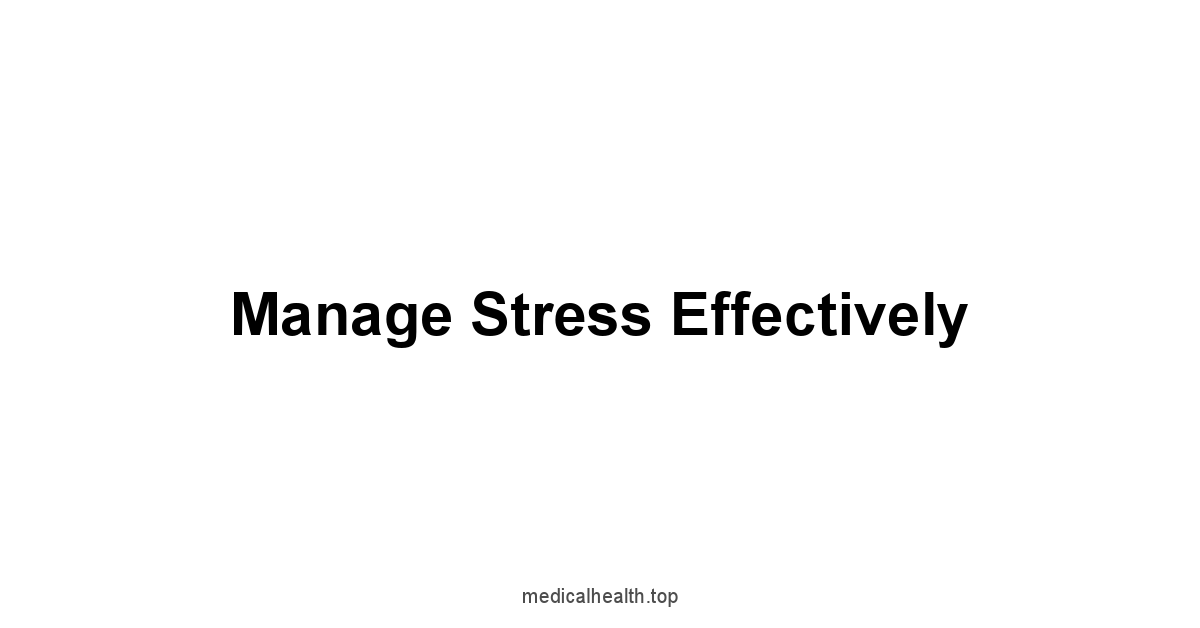
Stress, it’s a part of life, but it doesn’t have to run you. Learn to manage it, don’t let it build up.
Find ways to release it, to find calm amidst the chaos.
It’s about having a toolbox, a set of skills to deal with the pressures of daily life.
Don’t let stress take control, you need to manage it.
Effective stress management isn’t just about avoiding tense situations, it’s about building resilience and developing coping strategies.
Chronic stress can wreak havoc on your health, so taking the time to actively manage it is essential.
It’s about finding a way to balance the demands of your life with moments of calm, and ensuring you do not let the stress consume you.
Practice Mindfulness and Meditation
Mindfulness and meditation, it’s about being present, about focusing on the now.
It’s not about emptying your mind, it’s about observing your thoughts without judgment. Even a few minutes a day can make a difference.
It’s like giving your mind a break, a chance to reset. It’s about stillness in the midst of the storm.
- Reduces Stress: Mindfulness and meditation can calm your mind and reduce stress levels.
- Improves Focus: These practices help you focus on the present, improving your overall concentration.
- Promotes Emotional Regulation: They help you become more aware of your feelings and manage them effectively.
| Type of Practice | Description | Benefits |
|---|---|---|
| Meditation | Focusing on your breath, a word, or an image to calm your mind. | Reduces stress, improves concentration, promotes emotional balance |
| Mindfulness | Paying attention to the present moment without judgment, being aware of your surroundings and bodily sensations | Increases awareness, reduces stress, improves mental clarity |
| Guided Meditation | Listening to a guided recording that leads you through a meditation. | Good for beginners, helps with focusing the mind |
| Walking Meditation | Being mindful while walking, focusing on your steps and the environment around you. | Combines the benefits of movement and mindfulness |
- Start Small: Start with a few minutes each day and gradually increase the time as you become more comfortable.
- Be Consistent: Practice regularly, even when you don’t feel stressed.
- Find a Quiet Place: Find a quiet place where you won’t be interrupted.
Engage in Regular Exercise
Exercise, it’s not just for the body, it’s for the mind.
It’s a great way to release stress, to get the blood flowing, and to clear your head.
Find something you enjoy, it’s about making it a habit.
Movement helps your mind and your body to release tension. When you move, you change how you feel.
- Releases Endorphins: Exercise releases endorphins, which are natural mood boosters.
- Reduces Tension: Physical activity can reduce tension and stress.
- Improves Sleep: Regular exercise can improve your sleep, which can also help manage stress.
| Type of Exercise | How It Helps |
|---|---|
| Cardio | Releases endorphins, reduces tension, improves cardiovascular health |
| Strength Training | Reduces stress, improves overall physical health, increases confidence |
| Yoga | Combines physical movement with mindfulness, promotes relaxation and mental clarity |
| Outdoor Activities | Combines the benefits of exercise with the calming effect of nature |
- Choose Something You Enjoy: When you enjoy the activity you are more likely to stick with it.
- Consistency is Key: Regular exercise is better than sporadic intense sessions.
- Start Gradually: Begin with short workouts and gradually increase the time and intensity.
Seek Social Connection
Social connection, it’s vital. Don’t isolate yourself, you need people.
Talk to friends, spend time with family, get involved in your community.
Human connection is essential to your well-being, it’s not a luxury, it’s a need.
A strong social network can be a buffer against stress, a support system to get you through the tough times.
- Provides Support: Social connections provide a sense of support and belonging.
- Reduces Isolation: Isolation can increase feelings of stress and loneliness.
- Improves Mental Health: Strong social connections are linked to better mental health outcomes.
| Type of Connection | How it Helps |
|---|---|
| Spending Time with Family | Provides a sense of belonging, support, and unconditional love |
| Engaging with Friends | Provides social interaction, a sense of camaraderie, and a safe place to share your thoughts |
| Community Involvement | Connects you with people with shared interests, provides a sense of purpose |
| Mentoring or Helping Others | Gives you a sense of fulfillment and purpose |
| Support Groups | Connects you with people who understand your struggles |
- Make an Effort: Reach out to people, don’t wait for them to reach out to you.
- Be Present: When you are with others, be present and engaged.
- Cultivate Relationships: Nurture the relationships that are important to you.
Engage in Regular Health Check-ups

Check-ups, they’re not just for when you’re sick, they’re for prevention, for staying on top of things.
Don’t wait until something is wrong, get regular check-ups.
It’s about catching things early, about taking care of yourself.
Consider it maintenance for your body, a way to keep it running well. Proactive care is the best care.
Regular health check-ups are a crucial aspect of proactive health management.
They aren’t just about addressing existing issues, they’re about catching potential problems early, when they’re often more manageable.
Prevention is always more effective than a cure, and regular visits to your healthcare provider are a key part of that strategy.
Schedule Routine Doctor Visits
Routine doctor visits, they’re a necessity. Don’t wait until you’re sick. Schedule regular check-ups.
It’s about staying on top of your health, catching any potential problems early.
Think of it as a tune-up for your body, a way to ensure everything is running smoothly. It’s an investment in your long-term health.
- Early Detection: Regular check-ups help detect health problems in their early stages.
- Preventative Care: They provide an opportunity to receive preventative care, like vaccinations and screenings.
- Health Monitoring: Regular check-ups allow your doctor to monitor your health and make recommendations.
| Type of Check-Up | Frequency | Purpose |
|---|---|---|
| Annual Physical | Once a year | Overall health assessment, preventative care, early detection of diseases |
| Dental Check-Up | Every 6 months | Oral health assessment, cleaning, prevention of dental problems |
| Eye Exam | Every 1-2 years | Vision check, detection of eye diseases |
| Blood Pressure Check | Annually or as recommended by your doctor | Monitor blood pressure, detect hypertension |
| Cholesterol Check | Every 5 years or more frequently if needed | Monitor cholesterol levels, assess risk of heart disease |
- Schedule Appointments: Make your appointments in advance and stick to them.
- Prepare Questions: Prepare a list of questions you want to ask your doctor during your appointment.
- Keep Records: Keep track of your health records, such as test results, medications, and vaccinations.
Don’t Ignore Early Symptoms
Symptoms, they’re signals, messages from your body. Don’t ignore them. Don’t brush them aside. If something doesn’t feel right, pay attention. It’s better to be safe than sorry.
Small things can become big things if you don’t deal with them.
Early intervention is often the key to a good outcome.
- Early Detection: Ignoring symptoms can lead to delayed treatment and more serious health problems.
- Prevention: Early detection is crucial for preventing minor issues from becoming bigger ones.
- Better Outcomes: Treating a health issue early can lead to better outcomes and a faster recovery.
| Symptom | Possible Cause | Action to Take |
|---|---|---|
| Persistent Fatigue | Could be a sign of anemia, sleep problems, or other health issue. | See a doctor to determine the cause and receive treatment |
| Unexplained Weight Loss | May indicate a thyroid problem, diabetes, or cancer | See a doctor for diagnosis |
| Changes in Bowel Habits | Could indicate digestive issues, diet-related issues, or more serious illness | See a doctor to determine the cause and receive treatment |
| Chronic Pain | Could be related to injury, inflammation, or a more serious condition | See a doctor for diagnosis and treatment |
| Unusual Bleeding | May indicate various health issues depending on the location | See a doctor for diagnosis and treatment |
- Listen to Your Body: Pay attention to the signals your body is sending you.
- Don’t Self-Diagnose: Consult a doctor for diagnosis and treatment.
- Be Proactive: Don’t delay seeking medical attention if you notice any unusual symptoms.
Take Advantage of Preventative Screenings
Preventative screenings, they’re proactive measures, they’re about finding problems before they become problems. Don’t skip them. They’re a key part of staying healthy.
They can catch diseases in their early stages when they’re more treatable.
It’s about being proactive, about taking charge of your health. Think of them as shields.
- Early Detection: Screenings can detect diseases in their early stages when treatment is often more effective.
- Risk Reduction: They can help you identify risk factors and take steps to reduce your risk of developing certain conditions.
- Peace of Mind: Screenings can give you peace of mind by confirming your health status or identifying areas that need attention.
| Screening Type | Frequency | Importance |
|---|---|---|
| Mammogram | Annually for women over 40/50 or as recommended by doctor | Early detection of breast cancer, improves treatment outcomes |
| Pap Smear | Every 3 years for women or as recommended by your doctor | Detects cervical cancer, allowing for early treatment |
| Colonoscopy | Every 10 years after age 50, or more frequently if needed | Early detection and prevention of colorectal cancer |
| Prostate Exam | Annually for men over 50/45 or as recommended by doctor | Detects prostate cancer, helps to guide treatment plan |
| Blood Tests | As recommended by your doctor | Check for levels of cholesterol, blood sugar, thyroid hormones and other key health markers |
- Follow Guidelines: Follow recommended screening guidelines based on your age, gender, and medical history.
- Discuss with Your Doctor: Talk to your doctor about which screenings are right for you.
- Don’t Delay: Schedule your screenings as recommended, don’t put them off.
Cultivate Meaningful Relationships
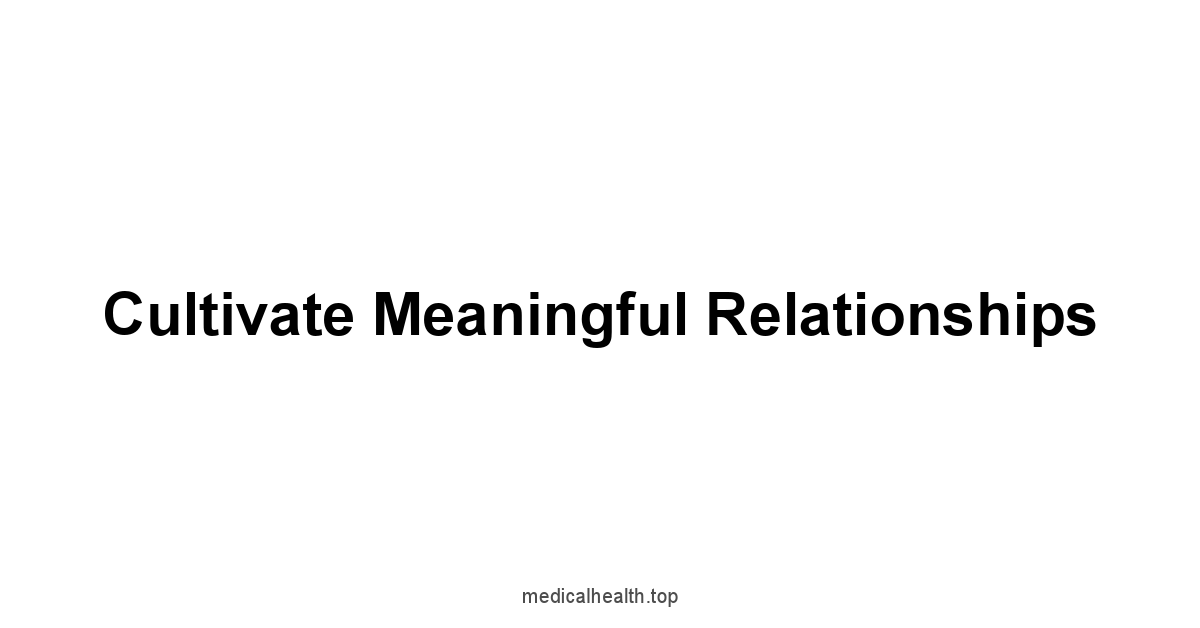
Relationships, they’re the threads that hold us together. Don’t take them for granted. Nurture them, invest in them.
It’s not about the number of friends you have, it’s about the quality of those connections.
Meaningful relationships, they’re a source of joy, comfort, and strength. They make life richer and fuller.
Meaningful relationships are the cornerstone of a fulfilling and balanced life.
They provide emotional support, a sense of belonging, and a network of individuals who care about your well-being
What do we think?
Maintaining optimal health isn’t a destination, it’s a continuous journey, a series of mindful choices that add up over time.
It’s about listening to your body, nourishing it with real food, staying hydrated, moving it daily, and ensuring it gets the rest it needs.
This isn’t about quick fixes or complicated routines, it’s about making a conscious effort to live well. It’s about balance.
The data is clear: a lifestyle that prioritizes whole foods, physical activity, adequate sleep, and stress management drastically reduces the risk of chronic diseases and significantly enhances quality of life, that is a fact.
Prioritizing your health is not selfish, it’s the most essential act of self-respect you can undertake.
It’s about understanding your body and providing it with what it needs to flourish.
These tips are not merely suggestions, they are the foundation of a healthier life and living well. Remember that consistency is key.
Small changes sustained over time bring far greater results than sporadic, intense efforts, you need to be dedicated but not a fanatic, enjoy the process, and make it part of your daily life. It’s the everyday choices that truly matter.
Building a life around these healthy habits is not about perfection, it’s about progress.
It’s about acknowledging that life will always present challenges, but having the tools to handle those challenges and continue moving forward is what matters the most. It’s about resilience.
You may have days where you don’t get the perfect amount of sleep or make the best food choice, but what matters is that you come back to these practices and keep going.
It’s about consistently making the best choices for yourself that create a better you.
And so, what lies ahead? It is in your hands.
Take the time to assess your current habits, identify areas where you can make improvements, and start implementing these tips today.
Start small, stay consistent, and you’ll begin to feel a difference, a positive change. Remember, it’s a marathon, not a sprint.
Prioritizing health is a commitment to yourself, a decision to live a life of vigor and vitality.
The journey to optimal health is ongoing, but with each small step, you move closer to a more vibrant, fulfilling existence, one day at a time.
Frequently Asked Questions
Why is eating whole foods so important?
Whole foods, the real stuff, they’re what your body needs. Not the processed junk.
They fuel you right, give you the vitamins and minerals, keep you going strong. It’s the foundation of everything else.
How much fruits and vegetables should I aim for daily?
Think of a rainbow on your plate.
Load up on different colors—red peppers, green spinach, blue berries.
Each color brings something different, each is essential. Don’t skimp on them, they’re the main event.
What are lean proteins and why should I choose them?
Lean proteins, chicken breast, fish, beans, lentils, that’s what you need. They build you up, keep you strong. Not just for muscles, but for everything. They keep you full, they keep you going.
What are healthy fats and where can I find them?
Fats get a bad rap, but the good ones, avocados, nuts, seeds, olive oil, you need those.
They keep your brain sharp, your body running smooth. It’s about choosing the right kind of fat.
Why should I limit processed foods and sugars?
Processed foods and sugars, they’re empty calories, they don’t do you any good. Hidden sugars, weird ingredients. Stick to the real stuff, keep it simple. Your body will thank you.
How important is it to stay hydrated and how much water should I drink?
Water, you’re mostly water, you need to keep that tank full.
Don’t wait until you’re thirsty, drink regularly throughout the day.
It keeps everything moving, everything working right.
What are electrolytes, and why are they important?
Electrolytes, they keep your body’s electrical system running. They balance fluids, keep your muscles moving. You lose them when you sweat, replace them.
It’s not just about the water, it’s about the balance.
How do I know if I’m drinking enough water?
Listen to your body. Thirst is a signal. Don’t ignore it.
Dark urine, that’s a sign you’re not drinking enough. Keep it light, keep it steady.
Why is it important to find a workout I enjoy?
Exercise shouldn’t be a punishment.
Find something you like, something you’ll stick with.
Dancing, swimming, hiking, lifting, whatever moves you. The key is consistency, not what’s best.
How do I balance cardio and strength training in my workout routine?
Cardio keeps your heart pumping, the blood flowing.
Strength training keeps your muscles strong, your bones healthy.
You need both, they work together, they are both essential.
What’s the best way to incorporate more movement into my day?
You don’t need a gym, move throughout your day.
Stairs instead of the elevator, walk instead of drive. It all adds up. It’s about being active.
Why is getting enough sleep so important?
Sleep is essential, not a luxury.
It’s when your body repairs itself, when your mind resets. Seven to nine hours, that’s the sweet spot. Don’t skimp on it.
What are some ways to create a consistent sleep schedule?
Go to bed and wake up at the same time each day, even weekends. It helps your body’s clock. Regularity is key to a good night’s rest.
What does a good bedtime routine look like?
Wind down, signal to your body it’s time to rest. Read a book, warm bath, listen to podcast.
Something calming, something that prepares you for sleep.
How can I manage stress effectively?
Stress is a part of life but you need to manage it.
Mindfulness, meditation, exercise, social connection, find what works for you and make it a habit.
Why is practicing mindfulness and meditation beneficial?
Mindfulness is about being present, focusing on the now. Meditation is giving your mind a break. A few minutes a day can make a difference. Stillness in the midst of a storm.
How does exercise help manage stress?
Exercise releases endorphins, it’s a mood booster. It reduces tension, it clears your head. It helps your mind and your body release tension.
How important is social connection for managing stress?
Don’t isolate, you need people.
Friends, family, your community, human connection is essential, not a luxury.
Why should I go for regular health check-ups?
Check-ups are for prevention, not just when you’re sick. It’s about catching things early. It’s about taking care of yourself. Proactive care is the best care.
What should I do if I notice early symptoms of a health issue?
Symptoms, they’re signals, messages from your body. Don’t ignore them. If something doesn’t feel right, pay attention. Don’t brush them aside.
Why are preventative screenings important?
Screenings are proactive measures, they find problems before they become problems. They catch diseases early. Think of them as shields.
Why are meaningful relationships so important for our health?
Relationships are the threads that hold us together. Nurture them, invest in them. They are a source of joy, comfort, and strength. They make life richer and fuller.
